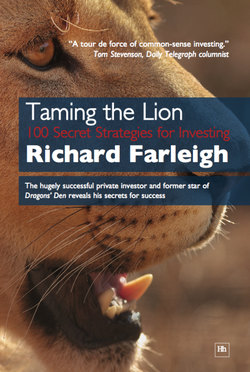Читать книгу Taming the Lion - Richard Farleigh - Страница 25
На сайте Литреса книга снята с продажи.
1.8 Listen and read very critically
ОглавлениеIf you are trading or investing, the media probably plays a large role in forming your views, but it always surprises me how often they present faulty logic. So it is vital to learn to be critical of what you read and hear.
Try to spot mistakes such as those in the following real examples.
“Experts say the market is overvalued.”
This is a subject I have already touched on. ‘Experts’ is the most overused word in finance. I see it all the time and wonder who these experts are! The only expert who interests me is someone with a proven track record of predicting the market. As we have seen, most professionals are not capable of outguessing the market, and those that do are not normally very interested in telling the media about their thoughts.
What’s more, you can normally find an expert somewhere to support any view at all. Perhaps the journalist has a heavy workload and just rang a friend at a bank, arranged to meet for a drink, asked about the market, and relayed this as ‘experts say the market is overvalued’.
“The money market predicts rates will rise from 3.5% today to 5% by late next year…The good news is that such predictions are probably wrong… Many analysts see rates reaching no higher than 4.5% in 18 months.”
These ‘analysts’ are a bit like the experts. I would have more faith in the market’s view. Those analysts are free to put their money where their mouth is and bet against the market if they want, but I’ve rarely met any with enough skill or conviction.
“With the euro at $1.25 a sustainable range is $1.22 to $1.28. Upside risks predominate though a short term drop to $1.15 is not out of the question.”
This is a bet each way. The easiest forecast to make is something like: if the price doesn’t rise, it will fall, or perhaps even stay the same. It’s useless.
“The pound will rally to $2.10 before weakening to $1.50 next year.”
This is what I call a ‘zig-zag’ forecast. Not content to just predict the next price move, the guy thinks he can predict the next two moves. He thinks he has the price on a string. A very untrustworthy type of forecast.
“Upward movement in the dollar will depend on whether the Fed lends a hand by signalling the end of rising interest rates.”
This is plain wrong. Rising US interest rates are good for the dollar. Sadly, mistakes as simple as this are not uncommon.
“The markets were overheated so a correction was expected.”
Hindsight. With comments like these I always wonder who expected the correction. Did they sell at the right time?
“I’m still looking for a positive January for the Australian dollar as it has done very well in four out of five of the last five starts to the year.”
Irrelevant. How can anyone print this?
“The market’s gone too far.”
Often these comments appear after a big move, but as you will see, I am a firm believer that the market often surprises everyone with how far it can go.
“The market’s going to 20,000!”
Or to the moon. Beware of the crazy forecaster looking for a publicity stunt. Yes, it does happen. The wildest forecast gets the most press, and fifteen minutes of fame for the forecaster.
So keep a critical mind when you read or hear market comments. Ask yourself these questions:
Does the commentator have any track record?
Are they considering all of the factors?
If they are pointing to influences which have been present for some time, why should they start moving the market now?
Are they relying on hindsight?
Are they hedging their bets?
Part of this is to be a sceptic. Who is the writer? Don’t listen to ill-informed, ad hoc, one-eyed, overpaid, inexperienced, sensationalist, untested, uncommitted and uninvolved people!
I would have more respect if a commentator was asked something and actually said ‘I don’t know’. He could then continue ‘because of the following…’ and you know you’re going to get a balanced answer. It’s brave to say ‘I don’t know’, especially if you’re in a meeting with traders or at a board meeting talking strategy, and everybody wants to hear your opinion. I try to be disciplined enough to admit that it is just too difficult sometimes to have a view.
As an example, at a Home House function before the Iraq war, Prince Charles asked me what was going to happen to the markets and I said “I don’t know, it depends on what happens with Iraq, and you’d probably know more about that than I would!” He agreed – somewhat nervously.
